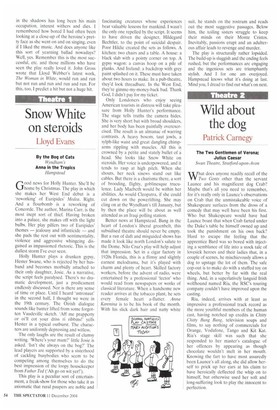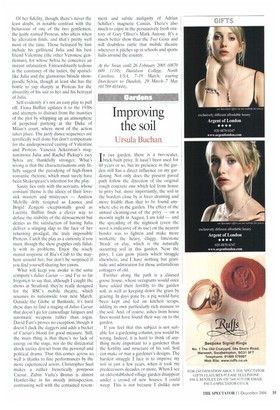Theatre 2
Wild about the dog
Patrick Carnegy
The Two Gentlemen of Verona; Julius Caesar Swan Theatre, Stratford-upon-Avon
What does anyone readily recall of the Two Gents other than the servant Launce and his magnificent dog Crab? Maybe that's all you need to remember, for it's really only in Launce's observations on Crab that the unmistakeable voice of Shakespeare surfaces from the dross of a comedy that may well have been his first. Who but Shakespeare would have had Launce boast that when Crab farted under the Duke's table he himself owned up and took the punishment on his own back? Hard to escape the feeling that the apprentice Bard was so bored with injecting a semblance of life into a stock tale of lovesick heroes and their ladies that, in a couple of scenes, he mischievously allows a dog to upstage the lot of them. The safe cop-out is to make do with a stuffed toy on wheels, but better by far with the real thing. And, in a superlatively languid Irish wolfhound named Ria, the RSC's touring company couldn't have improved upon the casting.
Ria, indeed, arrives with at least as impressive a professional track record as the more youthful members of the human cast, having notched up credits in Chitty Chitty Bang Bang, television soaps and films, to say nothing of commercials for Orange, Vodafone, Tango and Kit Kat. Ria's stage skill was such that she responded to her master's catalogue of her offences by appearing as though chocolate wouldn't melt in her mouth. Knowing the fart to have most assuredly been Launce's all along, she did allow herself to prick up her ears at his claim to have heroically deflected the whip on to himself, hut otherwise used her soft and long-suffering look to play the innocent to perfection. Of her fidelity, though, there's never the least doubt, in notable contrast with the behaviour of one of the two gentlemen, the justly named Proteus, who alters when he alteration finds, and that's pretty well most of the time. Those betrayed by him include his girlfriend Julia and his best friend Valentine (the other Veronese gentleman), for whose Sylvia he conceives an instant infatuation. Extraordinarily tedious is the constancy of the ladies, the spaniellike Julia and the glamorous blonde showpoodle Sylvia, though at least she has the bottle to yap sharply at Proteus for the absurdity of his suit to her and his betrayal of Julia.
Self-evidently it's not an easy play to pull off. Fiona Buffini updates it to the 1930s and attempts to distract from the inanities of the plot by whipping up an atmosphere of perpetual partying at the Duke of Milan's court, where most of the action takes place. The jazzy dance sequences are terrifically well done but don't compensate for the underpowered casting of Valentine and Proteus. Vanessa Ackerman's magnanimous Julia and Rachel Pickup's racy Sylvia are thankfully stronger. What's wrong is that the characterisations only fitfully suggest the parodying of high-flown romantic rhetoric, which must surely have been Shakespeare's intention for the play.
Sanity lies only with the servants, whose constant theme is the idiocy of their lovesick masters and mistresses — Andrew Melville drily resigned as Launce and Brigid Zengeni exceptionally good as Lucetta. Buffini finds a clever way to defuse the risibility of the denouement but denies us the satisfaction of having Julia deliver a stinging slap to the face of her returning prodigal, the truly impossible Proteus. Catch the play as a curiosity if you must, though the show grapples only fitfully with its problems. Enjoy the wisely muted response of Ria's Crab to the mayhem around her, but don't be surprised if you find yourself sharing her yawns.
What will keep you awake is the same company's Julius Caesar — and I've so far forgotten to say that, although I caught the shows at Stratford, they're really designed for the RSC's mobile theatre, which resumes its nationwide tour next March.
Outside the Globe at Bankside, it's hard these days to find a staging of Julius Caesar that doesn't go for camouflage fatigues and automatic weapons rather than togas. David Farr's proves no exception, though it doesn't duck the daggers and adds a bucket of Caesar's blood for good measure. Still, the main thing is that there's no lack of energy on the stage, nor do the directorial shock tactics detract from the personal and political drama. That this comes across so well is thanks to fine performances by the more experienced actors. Christopher Saul makes a rather frenetically pompous Caesar. Zubin Varla's Brutus is almost Hamlet-like in his moody introspection, contrasting well with the contained resent ment and subtle malignity of Adrian Schiller's magnetic Cassius. There's also much to enjoy in the persuasively fresh oratory of Gary Oliver's Mark Antony. It's a much better show than the Two Gents and will doubtless rattle that mobile theatre wherever it pitches up in schools and sports halls around the country.
At the Swan until 26 February 2005 (0870 609 1110); Davidson College, North Carolina, USA, 7-19 March; touring Dorchester to Dawlish, 29 March-7 May (01789 403444).











































































 Previous page
Previous page